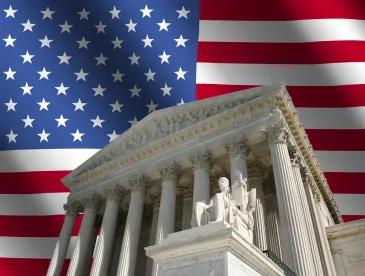In cases of trademark infringement, it has long been debated whether infringers should be required to disgorge profits if they unknowingly violated intellectual property laws.
For decades, there was a wide variance on whether a trademark owner would be able to recover profits in litigation. While the Lanham Act (1946), the guiding trademark legislation, states that profits could be awarded “subject to the principles of equity,” there has not been consensus on how that should be applied. One particular sticking point?
Willfulness, or the voluntary, intentional violation of a known legal duty.
But last week, the Supreme Court provided much-needed clarity on this topic for courts, attorneys, and business owners when it ruled in favor of Romag Fasteners against Fossil Inc. The U.S. Supreme Court handed down a ruling on trademark infringement, stating that infringers can, in fact, be made to hand over profits to a brand owner even when the infringers have not willfully violated the law.
Case Overview
Many people are familiar with Fossil, a popular fashion brand that is known for its wallets, watches, and handbags. Since 2002, Fossil has contracted with Romag Fasteners, a manufacturer of trademarked and patented magnetic snap fasteners, for their fasteners.
In 2010, Romag learned that Fossil’s China-based factories were utilizing counterfeit Romag fasteners in the assembly process. Romag filed suit against Fossil in the United States District Court for the District of Connecticut.
In the lawsuit, Romag argued that Fossil, along with various retailers, used counterfeit Romag fasteners and that this use violated trademark law. They requested profits, as well as a temporary restraining order, and a preliminary injunction to prevent the use of the counterfeit fasteners.
Romag’s Argument
At the center of Romag’s argument is the Lanham Act. The Lanham Act, also known as the Trademark Act, is the federal statute that oversees trademarks, service marks, and unfair competition, putting forth procedures for registering trademarks and guidelines for how infringements should be handled at the federal level.
Romag’s case against Fossil cited Section 1117(a) of the Lanham Act. This section provides financial recourse for a plaintiff’s claim of trademark violation: recovery of a defendant’s profits, any damages sustained by the plaintiff, and costs of the action.
However, there has been significant debate surrounding whether a willful infringement of a trademark should be a precondition for awarding profits. Among circuit courts, there have been discrepancies of opinion, creating uncertain terrain for trademark holders and their ability to successfully seek financial recourse in the form of profits.
Court Rulings
In April 2014, the jury at the United States District Court for the District of Connecticut found Fossil liable for patent and trademark infringement, but it determined that although Fossil had acted with “callous disregard,” it did not willfully infringe on the trademark and that “a finding of willfulness remains a requirement for an award of defendants’ profits in this Circuit.”
In response, Romag appealed to the United States Court of Appeals for the Federal Circuit, but the circuit court concurred with the district court’s ruling, underscoring that demonstration of willfulness was needed in trademark infringement cases; the Second Circuit Court is one of the circuit courts that only allows such awards if an infringement is willful. Following this ruling, Romag appealed to the U.S. Supreme Court.
The Supreme Court’s Response
The U.S. Supreme Court, with a unanimous judgment, evaluated the case under the framework of the Lanham Act and its provisions for remedying trademark violations. Justices took a nuanced view of the Lanham Act, specifically Section 1117(a), noting that while willfulness is a precondition for a profits award in issues of trademark dilution, such language is not written into the remedies for trademark infringement.
The opinion, written by Justice Neil Gorsuch, articulated that while trademark law requires demonstration of “willful” infringement for recovery of profit in trademark dilution cases, it is not a requirement for trademark infringement.
Justice Gorsuch still recognized the role of willfulness in assessing whether profits should be awarded. “We do not doubt that a trademark defendant’s mental state is a highly important consideration in determining whether an award of profits is appropriate,” he recognized. “But acknowledging that much is a far cry from insisting on the inflexible precondition to recovery Fossil advances.”
Impact of Ruling
As with any Supreme Court case ruling, there are significant implications for future cases. That the Supreme Court says that willfulness is not the sole factor in awarding profits in trademark infringement cases is impactful in several ways.
From a historical perspective, this decision resolves the long-held split between circuit courts on the issue of willfulness in awarding profits for trademark infringement. As such, this ruling provides more nuanced guidance for circuit courts that held that willfulness was the only factor to consider.
For trademark owners dealing with infringement issues, the ruling provides a more stable legal foundation for seeking monetary remedies. However, given Justice Gorsuch’s emphasis that willfulness is still a “highly important” factor, such cases still require careful consideration.



 />i
/>i

